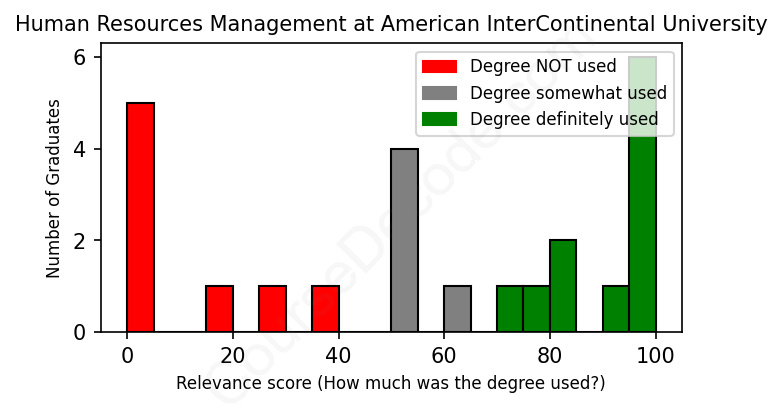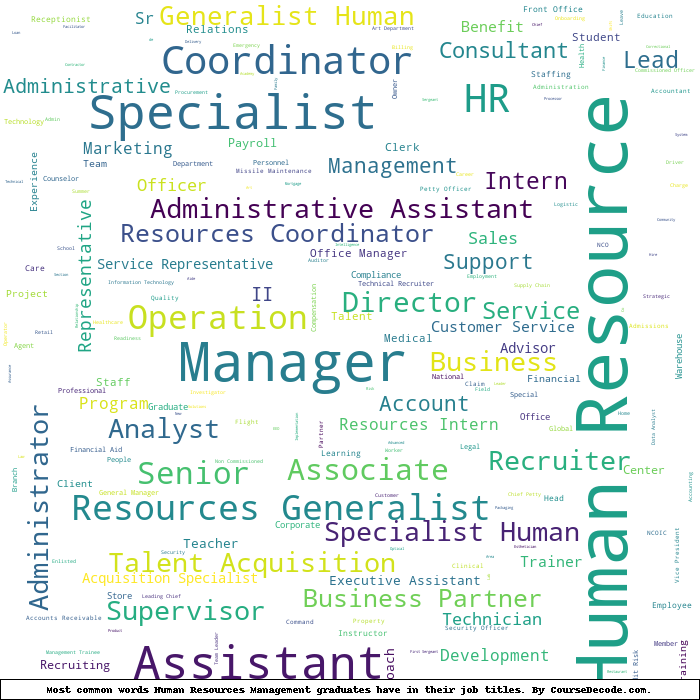
First, some facts. Of the Human Resources Management graduates from American InterContinental University we've analyzed , here's how many have used (or NOT used) their degree in their career:

These are estimates based on AI analysis of 24 LinkedIn profiles (see below).
The verdict? Significantly below average. Overall, with an average relevance score of 56%, Human Resources Management graduates from American InterContinental University have a much lower likelihood (-11%) of finding work in this field compared to the average graduate across all fields:
And for comparison, here's the chart for all profiles we've looked at across all degrees.
Also, after graduating, 41% of these graduates have pursued further education other than another Bachelor's degree (such as a Masters degree or other), compared to the average across all profiles of 35%. This suggests you may need more than just a Bachelors degree to be competitive as a Human Resources Management graduate.
See the details:
|
Relevance score: 0% We think this person has NOT gone into a career related to their degree. We think this person has NOT gone into a career related to their degree.
DEGREE INFOGraduated in 2013 from American InterContinental University with a Bachelor of Arts (BA) in Human Resources Management. No other secondary education since. JOB HISTORY SINCE GRADUATIONOwner Suprema Mamma Seamstress & More Jan 2015 - Present ABOUTI worked out of the home for many years when my older children were little. While I was obtaining my degree(s), I continued to raise my children & went on to have more! I now run a small business out of my home to give me flexibility to raise my own kids & contribute to our family's income. |
The top 10 most common jobs done by the graduates we've analyzed (ranked most common to least) are:
When looking at the career paths of those who graduated with a Human Resources Management degree from American InterContinental University, it seems that many have ventured into roles that aren't directly linked to the core principles of HR. Some common job titles include roles like Medical Coder, Account Manager, and Dispatchers, which primarily lean into areas like medical coding, customer service, or emergency communication rather than HR practices. However, there are notable exceptions, like HR Generalists and Specialists, who are in positions that make full use of their HR education, handling recruitment, employee relations, and compliance matters.
Overall, a decent portion of alumni tend to find themselves in relevant HR positions, especially those in the public sector or roles specifically labeled with HR in the title. Yet, many others have jobs that, while they might require some soft skills like communication and management, don't apply the specialized knowledge gained during their studies. It paints a varied picture where the knowledge from their degree isn't always utilized, but there's still a significant chunk of graduates who land jobs right in the heart of HR management. So, depending on the specific career path they take, the relevance of their HR education can really vary!
Here is a visual representation of the most common words in job titles for Human Resources Management graduates (this is across all Human Resources Management graduates we've analyzed, not just those who went to American InterContinental University):

So, if we take a look at the career paths of graduates from the Human Resources Management program at American InterContinental University, we can see some interesting patterns. Right after graduation, many of these folks seem to land their first jobs in roles that are somewhat related to HR, such as Human Resources Specialists and Generalists. There's also a mix of people doing things like medical coding or even retail positions, which might feel a bit off the HR track but still involve some people skills. It looks like they're generally starting off in entry-level HR roles or similar positions, which is a solid start for building a career in that field.
Fast forward 5 to 10 years later, and it seems like several graduates have moved up the ladder into more significant HR roles, such as HR Managers, Directors, and even some high-level positions like Director of Human Capital or Deputy Chief Human Capital Officer. This suggests that those who stick with the field are able to progress pretty well. However, there are definitely some graduates whose paths have led them into unrelated fields or positions that don’t leverage their HR training, like sales or management roles in totally different industries. Overall, while there are some diversions, many from this program appear to be carving out successful careers in Human Resources or related areas, which is encouraging for anyone thinking about pursuing this degree.
So, a Bachelor’s degree in Human Resources Management, whether at American InterContinental University or elsewhere, is generally not considered super tough compared to some other majors like engineering or sciences. You'll cover topics like employee relations, labor laws, and organizational behavior, which can be pretty interesting and relatable since they deal with real people and workplaces. That being said, you still have to put in the effort with assignments, projects, and maybe some group work, but it's often more about understanding concepts and applying them rather than memorizing complex theories. If you're into working with people and can handle some writing, you’ll probably find it manageable—and maybe even a bit fun!
Most commonly, in the LinkedIn profiles we've looked at, it takes people 2 years to finish a Bachelor degree in Human Resources Management.
Looking at these graduates from American InterContinental University, it seems like some of them are doing pretty well in their careers while others might not be raking it in as much. For example, the ones in HR and management roles—like the Director of HR or the various HR specialists—are likely pulling in decent salaries, especially since many have worked their way up the ladder. On the flip side, jobs like the gas station cashier and retail positions probably don't pay as well. So, while some are definitely making decent money, others might just be getting by. Overall, it’s a mixed bag, but it looks like some are definitely comfortable while some others are still building their careers and income.
Here is a visual representation of the most common words seen in the "about" section of LinkedIn profiles who have a Bachelor degree in Human Resources Management (this is across all Human Resources Management graduates we've analyzed, not just those who went to American InterContinental University). This may or may not be useful:

Here are all colleges offering a Bachelor degree in Human Resources Management (ordered by the average relevance score of their Human Resources Management graduates, best to worst) where we have analyzed at least 10 of their graduates:
| College | Score | Count |
|---|---|---|
 San Jose State University San Jose State University
|
83 | 14 |
 Western Governors University Western Governors University
|
71 | 50 |
 Saint Leo University Saint Leo University
|
71 | 12 |
 Davenport University Davenport University
|
71 | 11 |
 Capella University Capella University
|
70 | 15 |
 Rutgers University Rutgers University
|
67 | 14 |
 Southern New Hampshire University Southern New Hampshire University
|
66 | 30 |
 Lindenwood University Lindenwood University
|
64 | 11 |
 DeVry University DeVry University
|
63 | 31 |
 University of Maryland Global Campus University of Maryland Global Campus
|
61 | 22 |
 Upper Iowa University Upper Iowa University
|
61 | 12 |
 Columbia Southern University Columbia Southern University
|
59 | 28 |
 Central Michigan University Central Michigan University
|
57 | 15 |
 Colorado Technical University Colorado Technical University
|
57 | 16 |
 American InterContinental University American InterContinental University
|
56 | 24 |
 University of Phoenix University of Phoenix
|
55 | 90 |
 Ashford University Ashford University
|
52 | 36 |
 American Military University American Military University
|
52 | 13 |
 Park University Park University
|
52 | 21 |
 University of Maryland University College University of Maryland University College
|
51 | 15 |
 Strayer University Strayer University
|
47 | 31 |